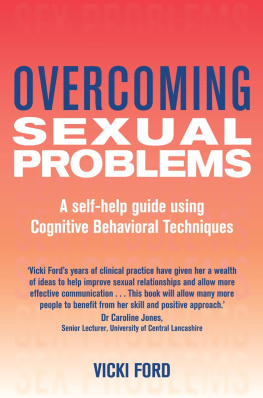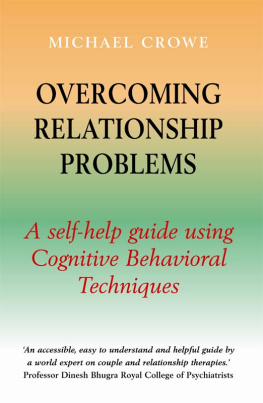Vicki Ford is a Counsellor and Psychosexual Therapist, working in private practise and for BUPA in North Wales. She has also trained and supervised other psychosexual counsellors within the National Health Service and Relate. She is accredited by both the British Association for Behavioural and Cognitive Psychotherapy (BABCP) and the British Association for Sexual and Relationship Therapy (BASRT) and is registered with the United Kingdom Council for Psychotherapy (UKCP).
The aim of the Overcoming series is to enable people with a range of common problems and disorders to take control of their own recovery program. Each title, with its specially tailored program, is devised by a practising clinician using the latest techniques of cognitive behavioral therapy techniques which have been shown to be highly effective in changing the way patients think about themselves and their problems. The series was initiated in 1993 by Peter Cooper, Professor of Psychology at Reading University and Research Fellow at the University of Cambridge in the UK, whose original book on overcoming bulimia nervosa and binge-eating continues to help many people in the USA, the UK, Europe and Australasia. Many books in the Overcoming series are recommended by the UK Department of Health under the Books on Prescription scheme.
Other titles in the series include:
OVERCOMING ANGER AND IRRITABILITY
OVERCOMING ANOREXIA NERVOSA
OVERCOMING ANXIETY
OVERCOMING BULIMIA NERVOSA AND BINGE-EATING
OVERCOMING CHILDHOOD TRAUMA
OVERCOMING CHRONIC FATIGUE
OVERCOMING CHRONIC PAIN
OVERCOMING COMPULSIVE GAMBLING
OVERCOMING DEPERSONALIZATION AND FEELINGS OF UNREALITY
OVERCOMING DEPRESSION
OVERCOMING GRIEF
OVERCOMING HEALTH ANXIETY
OVERCOMING INSOMNIA AND SLEEP PROBLEMS
OVERCOMING LOW SELF-ESTEEM
OVERCOMING MOOD SWINGS
OVERCOMING OBSESSIVE COMPULSIVE DISORDER
OVERCOMING PANIC
OVERCOMING PARANOID AND SUSPICIOUS THOUGHTS
OVERCOMING PROBLEM DRINKING
OVERCOMING RELATIONSHIP PROBLEMS
OVERCOMING SOCIAL ANXIETY AND SHYNESS
OVERCOMING TRAUMATIC STRESS
OVERCOMING WEIGHT PROBLEMS
OVERCOMING WORRY
OVERCOMING YOUR CHILDS FEARS AND WORRIES
OVERCOMING YOUR CHILDS SHYNESS AND SOCIAL ANXIETY
OVERCOMING YOUR SMOKING HABIT
All titles in the series are available by mail order.
Please see the order form at the back of this book.
www.overcoming.co.uk
OVERCOMING
SEXUAL
PROBLEMS
A self-help guide using
Cognitive Behavioral Techniques
VICKI FORD
ROBINSON
London
Constable & Robinson Ltd
3 The Lanchesters
162 Fulham Palace Road
London W6 9ER
www.constablerobinson.com
First published in the UK by Robinson,
an imprint of Constable & Robinson Ltd, 2005
This edition published in 2010
Copyright Vicki Ford, 2005, 2010
The right of Vicki Ford to be identified as the author of this work has been asserted by her in accordance with the Copyright, Designs and Patents Act 1988
All rights reserved. This book is sold subject to the condition that it shall not, by way of trade or otherwise, be lent, re-sold, hired out or otherwise circulated in any form of binding or cover other than that in which it is published and without a similar condition including this condition being imposed on the subsequent purchaser.
A copy of the British Library Cataloguing in Publication data is available from the British Library
Important Note
This book is not intended as a substitute for medical advice or treatment. Any person with a condition requiring medical attention should consult a qualified medical practitioner or suitable therapist.
ISBN: 978-1-84901-128-0
Printed and bound in the EU
1 3 5 7 9 10 8 6 4 2
Table of contents
PART ONE: Understanding Sexual Problems
PART TWO: Managing Sexual Problems A Self-Help Guide
Acknowledgments
My thanks go out to all my colleagues, my supervisor, and my clients. Without knowing you all I could not have written this book.
Thanks also to my children, Isobel, Tim, and Caroline; all my family, especially my sister Marian and also Ruby, Kathryn, and Alan; and my friends (you know who you are). Special thanks go to my husband, Dr David Ford, and Dr Garry Potter, whose discussions over dinner in the Canadian Rockies allowed me to think that writing a book was not an impossibility.
Introduction
Why cognitive behavior therapy?
You may have picked up this book uncertain as to why a psychological therapy such as cognitive behavioral therapy could help you overcome your sexual problems. Problems with sex are physical problems, you might think. Cognitive behavioral therapy is for people who have psychological problems, and thats not me. In fact, although CBT was developed initially for the treatment of depression, the techniques this therapy uses have been found to be extremely effective for a wide range of problems including anxiety disorders, eating disorders and drug and alcohol addictions. So what is CBT and how does it work?
In the 1950s and 1960s a set of techniques was developed, broadly collectively termed behavior therapy. These techniques shared two basic features. First, they aimed to remove symptoms (such as anxiety) by dealing with those symptoms themselves, rather than their deep-seated underlying historical causes (traditionally the focus of psychoanalysis, the approach developed by Sigmund Freud and his followers). Second, they were techniques, loosely related to what laboratory psychologists were finding out about the mechanisms of learning, which could potentially be put to the test, or had already been proven to be of practical value to sufferers. The area where these techniques proved of most value was in the treatment of anxiety disorders, especially specific phobias (such as fear of animals or heights) and agoraphobia, both notoriously difficult to treat using conventional psychotherapies.
After an initial flush of enthusiasm, discontent with behavior therapy grew. There were a number of reasons for this, an important one of which was the fact that behavior therapy did not deal with the internal thoughts that were so obviously central to the distress that patients were experiencing. In particular, behavior therapy proved inadequate when it came to the treatment of depression. In the late 1960s and early 1970s a treatment was developed specifically for depression called cognitive therapy. The pioneer in this enterprise was an American psychiatrist, Professor Aaron T. Beck, who developed a theory of depression which emphasized the importance of peoples depressed styles of thinking. He also specified a new form of therapy. It would not be an exaggeration to say that Becks work has changed the nature of psychotherapy, not just for depression but for a range of psychological problems.
The techniques introduced by Beck have been merged with the techniques developed earlier by the behavior therapists to produce a therapeutic approach which has come to be known as cognitive behavior therapy. This therapy has been subjected to the strictest scientific testing; and it has been found to be a highly successful treatment for a significant proportion of cases of depression. However, it has become clear that specific patterns of thinking are associated with a range of psychological problems and that treatments that deal with these styles of thinking are highly effective. So, effective cognitive behavioral treatments have been developed for anxiety disorders, like panic disorder, generalized anxiety disorder, specific phobias and social phobia, obsessive compulsive disorders, and hypochondriasis (health anxiety), as well as for other conditions such as compulsive gambling, alcohol and drug addiction, and eating disorders like bulimia nervosa and binge-eating disorder. Indeed, cognitive behavioral techniques have a wide application beyond the narrow categories of psychological disorders: they have been applied effectively, for example, to helping people with low self-esteem, those with marital difficulties, those who wish to give up smoking, and people with sexual problems.
Next page







